May 1, 2014:
A conversation with Robert S. DiPaola, MD, director of Rutgers Cancer Institute of New Jersey, which is a member of the Big Ten Cancer Research Consortium (CRC):
 Having integrated last year with Rutgers, The State University of New Jersey, Rutgers Cancer Institute of New Jersey is no stranger to collaboration when it comes to advancing scientific discoveries and developing innovative new treatment options for cancer patients. But as Dr. Robert S. DiPaola explains, being part of a consortium enables a wealth of expertise and resources to accomplish this very important mission.
Having integrated last year with Rutgers, The State University of New Jersey, Rutgers Cancer Institute of New Jersey is no stranger to collaboration when it comes to advancing scientific discoveries and developing innovative new treatment options for cancer patients. But as Dr. Robert S. DiPaola explains, being part of a consortium enables a wealth of expertise and resources to accomplish this very important mission.
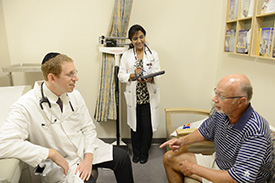 Q: What kind of impact do you see the CRC having on cancer clinical trials?
Q: What kind of impact do you see the CRC having on cancer clinical trials?
A: This collaboration will change the landscape of how we as investigators develop and deploy clinical trial offerings, not only at our own centers but nationwide. Each member institution has its own renowned experts and information arsenals. Included with that are unique resources such as cutting-edge technologies, biological specimens, clinical data and more. When shared, these means offer a wealth of knowledge that will help reshape and further advance clinical trials.
Q: What are some of the strengths Rutgers Cancer Institute of New Jersey brings to the consortium?
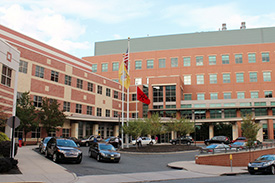 A: As the only CRC cancer center in the New York/New Jersey region and New Jersey’s only National Cancer Institute-designated Comprehensive Cancer Center, the Cancer Institute of New Jersey will provide patients in the region with access to the clinical trials developed by the consortium. In addition, certain trials will also be available through the Cancer Institute’s Network of hospitals from across New Jersey. Through the Cancer Institute Network, we provide multi-institutional arrangements that differ from those we have with co-collaborating cancer centers, as our center is responsible for the overall coordination and management of these trials. Together with our Network of hospitals, the Cancer Institute treats one third of cancer patients in the state, which is densely populated with multiple ethnicities. With that we have the ability to accrue unique patient populations that may not be as prevalent in other parts of the country for clinical trials.
A: As the only CRC cancer center in the New York/New Jersey region and New Jersey’s only National Cancer Institute-designated Comprehensive Cancer Center, the Cancer Institute of New Jersey will provide patients in the region with access to the clinical trials developed by the consortium. In addition, certain trials will also be available through the Cancer Institute’s Network of hospitals from across New Jersey. Through the Cancer Institute Network, we provide multi-institutional arrangements that differ from those we have with co-collaborating cancer centers, as our center is responsible for the overall coordination and management of these trials. Together with our Network of hospitals, the Cancer Institute treats one third of cancer patients in the state, which is densely populated with multiple ethnicities. With that we have the ability to accrue unique patient populations that may not be as prevalent in other parts of the country for clinical trials.
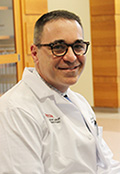 Helping to expand on this work, the Cancer Institute earlier this year welcomed Howard Kaufman, MD, FACS, as Associate Director for Clinical Science to oversee all aspects of our clinical research enterprise. Nationally recognized for his work in cancer immunology, Dr. Kaufman has expertise in clinical trial design and execution. Under his leadership, our team will sharpen our center’s clinical trials program both in aim and delivery.
Helping to expand on this work, the Cancer Institute earlier this year welcomed Howard Kaufman, MD, FACS, as Associate Director for Clinical Science to oversee all aspects of our clinical research enterprise. Nationally recognized for his work in cancer immunology, Dr. Kaufman has expertise in clinical trial design and execution. Under his leadership, our team will sharpen our center’s clinical trials program both in aim and delivery.
Q: What kind of scientific advances happening at Rutgers Cancer Institute of New Jersey are changing the way we diagnose and treat cancer?
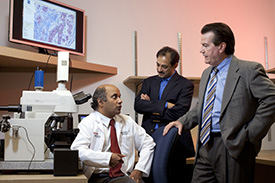 A: Precision – or personalized – medicine is an exciting approach that has rapidly gained momentum over the past few years. At the Cancer Institute we’re learning more about genomic alterations in rare and poor prognosis cancers through genomic profiling. When coupled with the analytical expertise of our in-house molecular tumor board, which consists of medical, surgical, and radiation oncologists; pathologists; systems biologists; biostatisticians and a host of others, the knowledge gained is directly applicable to patients through clinical trials. Furthermore, our partnership with RUCDR Infinite Biologics (the world’s largest university-based biorepository located within the Human Genetics Institute of New Jersey) allows for increased capacity for genomic sequencing. These findings help support recommended courses of therapy that may not have been identified through traditional means. For instance, an alteration found in a rare cancer may respond to a drug approved to treat an entirely different disease. If that is the case, we seek off-label use of this agent, thus providing the patient with an opportunity for therapy that may not have been known otherwise.
A: Precision – or personalized – medicine is an exciting approach that has rapidly gained momentum over the past few years. At the Cancer Institute we’re learning more about genomic alterations in rare and poor prognosis cancers through genomic profiling. When coupled with the analytical expertise of our in-house molecular tumor board, which consists of medical, surgical, and radiation oncologists; pathologists; systems biologists; biostatisticians and a host of others, the knowledge gained is directly applicable to patients through clinical trials. Furthermore, our partnership with RUCDR Infinite Biologics (the world’s largest university-based biorepository located within the Human Genetics Institute of New Jersey) allows for increased capacity for genomic sequencing. These findings help support recommended courses of therapy that may not have been identified through traditional means. For instance, an alteration found in a rare cancer may respond to a drug approved to treat an entirely different disease. If that is the case, we seek off-label use of this agent, thus providing the patient with an opportunity for therapy that may not have been known otherwise.
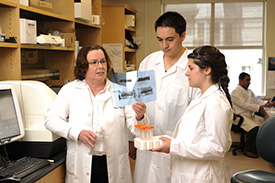 Rutgers Cancer Institute of New Jersey also is making advances with vaccine therapies, including one injected directly into the pancreas that is showing positive outcomes in treating pancreatic cancer. Under the leadership of internationally recognized researcher Eileen White, PhD – the Cancer Institute’s associate director for basic science – our center also continues to unravel the mysteries of cancer metabolism in collaboration with our consortium partner Princeton University. Our team is also making great strides in the areas of bioinformatics and systems biology including collaborations with the Institute for Advanced Study in Princeton. Coupled with cancer immunotherapy and precision medicine, all of these areas, as well as others, are providing opportunities for cancer researchers and advances for cancer patients.
Rutgers Cancer Institute of New Jersey also is making advances with vaccine therapies, including one injected directly into the pancreas that is showing positive outcomes in treating pancreatic cancer. Under the leadership of internationally recognized researcher Eileen White, PhD – the Cancer Institute’s associate director for basic science – our center also continues to unravel the mysteries of cancer metabolism in collaboration with our consortium partner Princeton University. Our team is also making great strides in the areas of bioinformatics and systems biology including collaborations with the Institute for Advanced Study in Princeton. Coupled with cancer immunotherapy and precision medicine, all of these areas, as well as others, are providing opportunities for cancer researchers and advances for cancer patients.
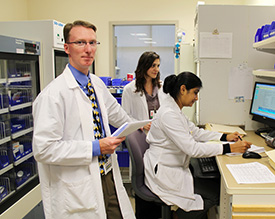 Q: How will being a part of the Big Ten CRC differ from other collaborative efforts your center has been a part of?
Q: How will being a part of the Big Ten CRC differ from other collaborative efforts your center has been a part of?
A: As a Comprehensive Cancer Center as designated by the National Cancer Institute, Rutgers Cancer Institute of New Jersey has had the opportunity to work collaboratively with other cancer centers across the country. While the overall aim of these consortium partnerships has been to develop new, cutting-edge therapies for patients, the scope of the Big Ten CRC will allow for the membership to improve on the overall process of clinical trials. This effort is complementary to what the National Cancer Institute is doing in reforming its clinical trials program creating a National Clinical Trials Network that aims to improve the speed and efficiency of cancer protocols.
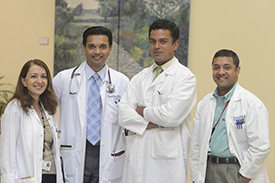 To learn more, visit www.cinj.org.
To learn more, visit www.cinj.org.
About the Big Ten Cancer Research Consortium: The Big Ten Cancer Research Consortium creates a unique team-research culture to drive science rapidly from ideas to treatment-changing paradigms. Within this innovative environment, today’s research leaders collaborate with and mentor the research leaders of tomorrow with the unified goal of improving the lives of all patients with cancer.
About the Big Ten Conference: The Big Ten Conference is an association of world-class universities whose member institutions share a common mission of research, graduate, professional and undergraduate teaching and public service. Founded in 1896, the Big Ten has sustained a comprehensive set of shared practices and policies that enforce the priority of academics in student-athletes’ lives and emphasize the values of integrity, fairness and competitiveness. The broad-based athletic programs of the 12 Big Ten institutions provide in excess of $141 million in direct financial aid to more than 8,200 student-athletes playing on more than 300 teams in 43 different sports. The Big Ten sponsors 26 official conference sports, 13 for men and 13 for women, and will add men’s and women’s lacrosse as the 27th and 28th official sports for the 2014-15 academic year. For more information, visit www.bigten.org.

















Subscribe to the Big Ten CRC Newsletter X
X Facebook
Facebook YouTube
YouTube